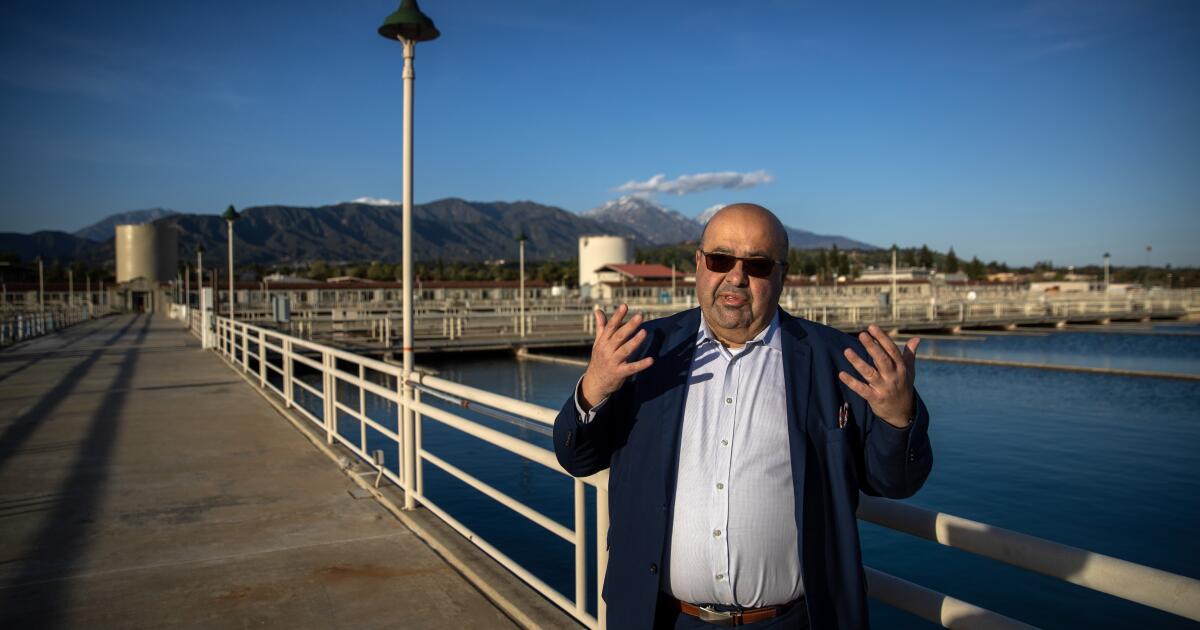Politics
Top manager of California's largest water supplier accused of sexism and harassment

The board of the Metropolitan Water District of Southern California voted to place General Manager Adel Hagekhalil on leave Thursday while the agency investigates accusations of harassment against him by the agency’s chief financial officer.
Chief Financial Officer Katano Kasaine made the allegations in a confidential letter to the board, which was leaked and published by Politico. She said Hagekhalil has harassed, demeaned and sidelined her and created a hostile work environment.
MWD Board Chair Adán Ortega Jr. announced the decision after a closed-door meeting, saying the board voted to immediately place Hagekhalil on administrative leave and to temporarily appoint Deven Upadhyay, an assistant general manager, as interim general manager.
“This board is determined to act with unity and swiftness in order to protect everybody,” Ortega said. “My hope is that under Deven’s leadership in the coming months, that we will find some common purpose, that we will realize the urgency of the policies and the tasks that confront us.”
Ortega said in an interview after the meeting that there are “several investigations” underway. He declined to comment on the other investigations, and said Hagekhalil will be on administrative leave for up to 90 days.
“We’re calculating that that’s the amount of time it will take to complete the investigations,” Ortega told The Times.
Ortega began the meeting by announcing that the board had decided earlier this week to open an investigation. He called a vote allowing him to publicly discuss confidential matters discussed during that Tuesday meeting, and he criticized the release of the letter.
“The person who released this sensitive document knows that we as a board and as individuals are constrained by law not to reveal closed-session proceedings and related documents,” Ortega said. “They were trying to take advantage of that. But I’m not letting them. At minimum, by releasing the document, that person has tried to set a narrative that is potentially harmful to the general manager, the chief financial officer, this board and this agency, and they know it.”
Ortega said the board acted to start the investigation “in order to avoid the leak that happened anyway.” He said he and other board members believe that both Hagekhalil and Kasaine “deserve the due process prescribed by law.”
Thursday’s special meeting was scheduled while Hagekhalil was traveling in Singapore for a water conference. According to the board meeting agenda, the closed session included a review of Hagekhalil’s performance as well as a discussion of potential discipline or dismissal. On those two items, Ortega said, there were “no reportable actions” during the closed meeting.
Board members voted unanimously to place Hagekhalil on administrative leave, with one abstention and several board members absent.
Kasaine said in her letter that throughout 30 years of government work, “I have encountered toxic work environments, but none as hostile and dysfunctional as Metropolitan.”
“Despite my tireless dedication and outstanding performance ratings, it has become incredibly stressful to even show up for work. I am constantly scrutinized, sidelined, and demeaned for standing up against issues that are not in Metropolitan’s best interest,” Kasaine said in the May 27 letter, which following the leak was released by the district.
Hagekhalil responded to the accusations in a text message, denying any wrongdoing.
“I’ve always treated our MWD staff with complete respect, professionalism and kindness. Always,” Hagekhalil said. “I stand by my record of reforming the agency’s workforce policies and creating a healthy, supportive and inclusive work environment. Any investigation of these unsubstantiated claims will reveal that they are false, and I look forward to returning to my work at MWD to serve our staff and our community as soon as possible.”
He said the claims are “disagreements on management decisions.”
“When I started at MWD, I increased Katano’s responsibilities on an interim basis, and as CFO, she has had an important leadership role in recent MWD actions, including overseeing the agency’s adoption of a two-year budget and development of a long-range financial plan,” Hagekhalil said.
MWD is the nation’s largest wholesale supplier of drinking water, serving cities and agencies that supply 19 million people across Southern California.
Ortega lamented that with the release of the letter, “the confidentiality that they were to enjoy in order to correct matters, has now been compromised for the benefit of an undeclared individual who, depending on our silence, thought that they could deceive the press.”
“Thus, the person who released the document should not be considered a whistleblower, but should be questioned by those listening to him or her about their motives and the personal gain they would like to achieve by violating the rights of others and trying to taint our agency,” Ortega said, reading from a prepared statement. “While I can’t reveal the extent of our continuing deliberations today, or guarantee outcomes, on behalf of the board, I want to assure our workforce that we will continue to act in a transparent way to bring security, harmony and protection of rights for everyone who works here so we can do the work of bringing water to Southern California.”
Several people spoke at the meeting, expressing support for Hagekhalil and calling for a fair and impartial investigation.
“Due process has been tainted in a major, major way,” said Mark Gold, director of water scarcity solutions for the Natural Resources Defense Council. “It’s a personnel issue that you need to investigate and keep private as much as possible.”
Gold also said Hagekhalil “lives and breathes water in this agency more than anyone I’ve ever seen.”
Hagekhalil has led the agency at a time of major challenges, including negotiations aimed at addressing shortages of Colorado River water, plans for building the country’s largest wastewater recycling facility, and the MWD board’s consideration of Gov. Gavin Newsom’s plan to build a $20-billion water tunnel in the Sacramento-San Joaquin River Delta.
Hagekhalil previously worked for the city of Los Angeles leading programs focusing on sewers and streets. He was appointed MWD’s general manager in 2021 after a bitter power struggle among board members. He earns $503,942 a year as general manager and chief executive, leading more than 1,900 employees and overseeing more than $2.2 billion in annual spending.
Hagekhalil has said he is seeking to transform the district to make the region’s water supplies resilient to the effects of climate change.
“This is at a time when MWD is at a crossroads,” said Bruce Reznik, executive director of Los Angeles Waterkeeper, who has supported Hagekhalil’s efforts at MWD. “The old way of doing business, the old model for water, doesn’t work in our climate change reality, and I know MWD is wrestling with these very challenging issues. And I think Adel and his team have done an amazing job of starting to tackle that.”
Some of Hagekhalil’s supporters questioned why the matter was brought to the board while he was traveling, and suggested the public airing of grievances appeared to be a calculated ambush.
Kasaine wrote in the letter that she has been “maligned, harassed, bullied, and sidelined from my core responsibilities.” She said Hagekhalil’s “preference for male colleagues/staff over me has continued to sow the seeds of sexism and belittling.”
She also criticized Hagekhalil’s hiring of a team of trusted, highly paid consultants, calling it “an entire shadow leadership team, wielding more power than those holding official titles.”
Kasaine said Hagekhalil has told her that she will no longer have oversight responsibilities leading the district’s human resources and diversity, equity and inclusion offices.
“Taking these core services from me without any justification or reason is highly suspect and leads me to believe it is retaliation for speaking up on key concerns,” Kasaine wrote in the letter.
During Thursday’s meeting, many speakers said the matter demands a thorough and impartial investigation.
Ellen Mackey, chair of the employee union’s women’s caucus, told the board that as the situation stands, “we don’t have facts, just accusations.”
Some environmental advocates said they suspect a link between the surfacing of allegations against Hagekhalil and his work leading efforts to take the district in a new direction by developing a climate adaptation plan, investing in local water sources and revamping MWD’s financial model.
Charming Evelyn, who chairs the Sierra Club’s water committee in Southern California, said Hagekhalil has brought positive changes to the MWD, and that has put him in conflict with the district’s “old guard.”
The California Water Impact Network, an advocacy group, said in a press release that the possibility that Hagekhalil’s efforts might lead the board to eventually vote against the proposed Delta Conveyance Project “has led to an attempted mutiny” by supporters of the tunnel among the district’s board members and staff.
The group noted that Kasaine currently serves as treasurer of the Delta Conveyance Design and Construction Authority, the entity that was created to finance the tunnel project.
Max Gomberg, a board member of the California Water Impact Network, charged that the move against Hagekhalil appears to be a “political power play” designed to push through the tunnel project.
Leaders of Indigenous tribes and other environmental groups also voiced concerns.
Krystal Moreno of the Shingle Springs Band of Miwok Indians said that while the accusations should be independently investigated, “we also ask that the investigation include the questionable and concerning timing of these allegations and the board’s swift attempt to remove Adel without any investigation while he has been out of the country.”
Barbara Barrigan-Parrilla, executive director of the group Restore the Delta, which opposes the tunnel project, said the allegations and the timing of the claims are “equally problematic.”
“Both deserve a thorough and fact based investigation with transparent findings and due process,” she said.

Politics
Marjorie Taylor Greene criticizes Trump’s meetings with Zelenskyy, Netanyahu: ‘Can we just do America?’

NEWYou can now listen to Fox News articles!
Rep. Marjorie Taylor Greene, R-Ga., on Sunday called for President Trump to only focus on America’s needs as the president meets with Ukrainian President Volodymyr Zelenskyy and Israeli Prime Minister Benjamin Netanyahu.
The president has been heavily involved in the Russia-Ukraine and Israel-Hamas conflicts since returning to the White House.
Trump met with Zelenskyy on Sunday at Mar-a-Lago to discuss a peace plan aimed at ending the Russia-Ukraine war that began with an invasion by Moscow in February 2022.
Netanyahu arrived in Florida on Sunday ahead of their scheduled meeting on Monday at Trump’s estate to address Israel’s conflicts in the Middle East. It will be the sixth meeting of the year between the two leaders.
TRUMP ZELENSKYY SAY UKRAINE PEACE DEAL CLOSE BUT ‘THORNY ISSUES’ REMAIN AFTER FLORIDA TALKS
Rep. Marjorie Taylor Greene criticized President Donald Trump’s meetings with Ukrainian President Volodymyr Zelenskyy and Israeli Prime Minister Benjamin Netanyahu. (Anna Moneymaker/Getty Images)
Greene, responding to Trump’s meeting with Zelenskyy and Netanyahu, said that the Trump administration should address the needs of Americans rather than becoming further involved in global conflicts.
“Zelensky today. Netanyahu tomorrow,” she wrote on X.
President Donald Trump welcomes Ukrainian President Volodymyr Zelenskyy at his Mar-a-Lago residence in Palm Beach, Florida. (Jim WATSON / AFP via Getty Images)
“Can we just do America?” the congresswoman continued.
The congresswoman has been a vocal critic of supplying U.S. military aid to foreign countries amid the conflicts in Europe and the Middle East.
She has also referred to Zelenskyy as “a dictator who canceled elections” and labeled Israel’s military campaign in Gaza as a genocide and humanitarian crisis.
ZELENSKYY READY TO PRESENT NEW PEACE PROPOSALS TO US AND RUSSIA AFTER WORKING WITH EUROPEAN TALKS
Rep. Marjorie Taylor Greene and President Donald Trump had a public feud in recent months. (Getty Images)
CLICK HERE TO DOWNLOAD THE FOX NEWS APP
This comes after Taylor Greene, who is set to resign from the House in January, had a public spat with Trump over the past few months as Trump took issue with the Georgia Republican’s push to release documents related to the investigations into deceased sex predator Jeffrey Epstein.
Trump had withdrawn his endorsement of Greene and called her a “traitor” over the public feud.
Politics
Commentary: America tried something new in 2025. It’s not going well

Is there a dumpster somewhere to torch and bury this year of bedlam, 2025?
We near its end with equal amounts relief and trepidation. Surely we can’t be expected to endure another such tumultuous turn around the sun?
It was only January that Donald Trump moved back into the White House, apparently toting trunkloads of gilt for the walls. Within weeks, he’d declared an emergency at the border; set in motion plans to dismantle government agencies; fired masses of federal workers; and tariffs, tariffs, tariffs.
Demonstrators at a No Kings rally in Washington, protesting actions by President Trump and Elon Musk.
(Jose Luis Magana / Associated Press)
By spring, the administration was attacking Harvard as a test case for strong-arming higher education. By June, Trump’s grotesquely misnamed Big Beautiful Bill had become law, giving $1 trillion in tax cuts to billionaires and funding a deportation effort (and armed force) that has fundamentally reshaped American immigration law and ended any pretense about targeting “the worst of the worst.”
Fall and winter have brought questionable bombings of boats in the Caribbean, a further backing away from Ukraine, a crackdown on opposition to Trump by classifying it as leftist terrorism and congressional inaction on healthcare that will leave many struggling to stay insured.
That’s the short list.
It was a year when America tried something new, and while adherents of the MAGA movement may celebrate much of it, our columnists Anita Chabria and Mark Z. Barabak have a different perspective.
Here, they renew their annual tradition of looking at the year past and offering some thoughts on what the new year may bring.
Chabria: Welp, that was something. I can’t say 2025 was a stellar year for the American experiment, but it certainly will make the history books.
Before we dive into pure politics, I’ll start with something positive. I met a married couple at a No Kings rally in Sacramento who were dressed up as dinosaurs, inspired by the Portland Frog, an activist who wears an inflatable amphibian suit.
When I asked why, the husband told me, “If you don’t do something soon, you will have democracy be extinct.”

Crowds participate in No Kings Day in downtown Los Angeles in October.
(Genaro Molina / Los Angeles Times)
I loved that so many Americans were doing something by turning out to not just protest policies that hit personally, but to rally in support of democracy writ large. For many, it was their first time taking this kind of action, and they were doing it in a way that expressed optimism and possibility rather than giving in to anger or despair. Where there is humor, there is hope.
Barabak: As in, it only hurts when I laugh?
In 2024, a plurality of Americans voted to reinstall Trump in the White House — warts, felony conviction and all — mainly in the hope he would bring down the cost of living and make eggs and gasoline affordable again.
While eggs and gas are no longer exorbitant, the cost of just about everything else continues to climb. Or, in the case of beef, utility bills and insurance, skyrocket.

The John F. Kennedy Memorial Center for the Performing Arts is another of the long-standing institutions Trump has smeared his name across.
(Jacquelyn Martin / Associated Press)
Meantime, the president seems less concerned with improving voters’ lives than smearing his name on every object he lays his eyes on, one of the latest examples being the John F. Kennedy Center for the Performing Arts.
(The only place Trump doesn’t want to see his name is in those voluminous Epstein files.)
I wonder: Why stop there? Why not brand these the United States of Trump-erica, then boast we live in the “hottest” country on Planet Trump?
Chabria: Stop giving him ideas!
You and I agree that it’s been a difficult year full of absurdity, but we’ve disagreed on how seriously to take Trump as a threat to democracy. As the year closes, I am more concerned than ever.
It’s not the ugly antics of ego that alarm me, but the devastating policies that will be hard to undo — if we get the chance to undo them.
The race-based witch hunt of deportations is obviously at the top of that list, but the demolition of both K-12 and higher education; the dismantling of federal agencies, thereby cutting our scientific power as a nation; the increasing oligarchy of tech industrialists; the quiet placement of election deniers in key election posts — these are all hammers bashing away at our democracy.
Now, we are seeing overt antisemitism and racism on the MAGA right, with alarming acceptance from many. The far right has championed a debate as dumb as it is frightening, about “heritage” Americans being somehow a higher class of citizens than nonwhites.

Vice President JD Vance speaks at the University of Mississippi in Oxford.
(Gerald Herbert / Associated Press)
Recently, Vice President JD Vance gave a speech in which he announced, “In the United States of America, you don’t have to apologize for being white anymore,” and Trump has said he wants to start taking away citizenship from legal immigrants. Both men claim America is a Christian nation, and eschew diversity as a value.
Do you still think American democracy is secure, and this political moment will pass without lasting damage to our democratic norms?
Barabak: I’ll start with some differentiation.
I agree that Trump is sowing seeds or, more specifically, enacting policies and programs, that will germinate and do damage for many years to come.
Alienating our allies, terrorizing communities with his prejudicial anti-immigrant policies — which go far beyond a reasonable tightening of border security — starving science and other research programs. The list is a long and depressing one, as you suggest.
But I do believe — cue the trumpets and cherubs — there is nothing beyond the power of voters to fix.
To quote, well, me, there is no organism on the planet more sensitive to heat and light than a politician. We’ve already seen an anti-Trump backlash in a series of elections held this year, in red and blue state alike. A strong repudiation in the 2026 midterm election will do more than all the editorial tut-tutting and protest marches combined. (Not that either are bad things.)

A stressed-out seeming poll worker in a polling station at Los Angeles’ Union Station.
(Eric Thayer / Los Angeles Times)
The best way to preserve our democracy and uphold America’s values is for unhappy citizens to register their dissent via the ballot box. And to address at least one of your concerns, I’m not too worried about Trump somehow nullifying the results, given legal checks and the decentralization of our election system.
Installing lawmakers in Congress with a mandate to hold Trump to account would be a good start toward repairing at least some of the damage he’s wrought. And if it turns into a Republican rout, it’ll be quite something to watch the president’s onetime allies run for the hills as fast as their weak knees allow.
Chabria: OMG! It’s a holiday miracle. We agree!
I think the midterms will be messy, but I don’t think this will be an election where Trump, or anyone, outright tries to undo overall results.
Although I do think the groundwork will be laid to sow further doubt in our election integrity ahead of 2028, and we will see bogus claims of fraud and lawsuits.
So the midterms very well could be a reset if Democrats take control of something, anything. We would likely not see past damage repaired, but may see enough opposition to slow the pace of whatever is happening now, and offer transparency and oversight.
But the 2026 election only matters if people vote, which historically is not something a great number of people do in midterms. At this point, there are few people out there who haven’t heard about the stakes in November, but that still doesn’t translate to folks — lazy, busy, distracted — weighing in.
If proposed restrictions on mail-in ballots or voter identification take effect, even just in some states, that will also change the outcomes.
But there is hope, always hope.
Barabak: On that note, let’s recognize a few of the many good things that happened in 2025.
MacKenzie Scott donated $700 million to more than a dozen historically Black colleges and universities, showing that not all tech billionaires are selfish and venal.
The Dodgers won their second championship and, while this San Francisco Giants fan was not pleased, their seven-game thriller against the Toronto Blue Jays was a World Series for the ages.
And the strength and resilience shown by survivors of January’s SoCal firestorm has been something to behold.
Any others, beside your demonstrating dinos, who deserve commendation?

Pope Leo XIV waves after delivering the Christmas Day blessing from the main balcony of St. Peter’s Basilica at the Vatican.
(Gregorio Borgia / Associated Press)
Chabria: Though I’m not Catholic, I have been surprisingly inspired by Pope Leo XIV.
So I’ll leave us with a bit of his advice for the future: “Be agents of communion, capable of breaking down the logic of division and polarization, of individualism and egocentrism.”
Many of us are tired, and suffering from Trump fatigue. Regardless, to put it in nonpapal terms, it may be a dumpster — but we’re all in it together.
Barabak: I’d like to end, as we do each year, with a thank you to our readers.
Anita and I wouldn’t be here — which would greatly please some folks — but for you. (And a special nod to the paid subscribers out there. You help keep the lights on.)
Here’s wishing each and all a happy, healthy and prosperous new year.
We’ll see you again in 2026.
Politics
The biggest losers of 2025: Who fell flat as the year closed

NEWYou can now listen to Fox News articles!
2025 didn’t just expose Democratic divisions — it created a short list of political losers whose missteps are already shaping the battlefield for 2026. From establishment leaders squeezed by a restless progressive base to national figures who burned precious time, this past year has left behind a series of cautionary tales for a party out of power.
MODERATE DEMOCRATS PUSH BACK AS PROGRESSIVES MOVE TO OUST JEFFRIES, CLARK OVER TRUMP STRATEGY
Senate Minority Leader Chuck Schumer, D-N.Y., right, and House Minority Leader Hakeem Jeffries, D-N.Y., walk speak to members of the media outside the West Wing at the White House in Washington, Monday, Sept. 29, 2025, in Washington. (AP Photo/Evan Vucci)
Establishment and old-school Democrats
The loudest, most visible Democratic figures haven’t just voiced opposition to the Trump administration — they’ve also made it clear they expect a new version of the party to emerge going forward. From Mayor-elect Zohran Mamdani in New York City promising expansive government program increases to Rep. Alexandria Ocasio-Cortez’s hint that she could beat Vice President J.D. Vance in a bid for the presidency, progressives can easily say they had some of the most visible momentum in 2025.
And that’s bad news for old-school Democrats.
As recently as last month, both House Minority Leader Hakeem Jeffries, D-N.Y., and House Whip Katherine Clark, D-Mass., faced primary challenges from their progressive base. These challengers cited dissatisfaction with their resistance against the administration. It’s unclear if those calls are disproportionately loud in a moment where Democrats find themselves out of power. But many moderate Democrats told Fox News Digital they don’t think it’s helping win over the electorate’s political middle.
Should progressives continue to crowd out the picture in 2026, more establishment Democrats may find it increasingly difficult to ignore pressure from their far-left flank as the nation heads into the midterms.
GOP SEIZES ON DEM CIVIL WAR AS PROGRESSIVES JUMP INTO KEY 2026 SENATE RACES: ‘THEY’RE IN SHAMBLES’
California Gov. Gavin Newsom speaks during a campaign event in support of Proposition 50 in San Francisco, Monday, Nov. 3, 2025. (Gabrielle Lurie/San Francisco Chronicle via Getty Images)
Gavin Newsom
California Gov. Gavin Newsom is running out of time to prove why he could be something more than a party messaging figure. In the past year, he’s pigeonholed himself into exactly that role.
In 2025, Newsom cemented himself as one of the key Democratic foils to Trump’s agenda. And on that front, there’s little question he capitalized on the attention.
Most notably, Newsom pushed through a redistricting effort meant to squeeze five Republicans out of office after Texas advanced a similar plan earlier this year. While the plan received mixed reviews — even from Democrats in the state who were wary of fighting fire with fire — it has certainly advanced Newsom’s national status.
But like every would-be Trump foil, Newsom finds himself somewhat reliant on Trump for his next move. Should Newsom begin to position himself for a 2028 bid for the White House, he won’t have that luxury around forever, and he only has one more year as California’s governor.
Newsom burned precious time in 2025 to show voters in California and across the country what kind of executive he could be.
DEMOCRATIC HEAVYWEIGHTS HARRIS, NEWSOM TURN HEADS, FUEL 2028 SPECULATION
Former President Joe Biden talks to reporters on the South Lawn of the White House, Monday, Sept. 2, 2024, in Washington, D.C. (AP Photo/Mark Schiefelbein)
Joe Biden
On several key issues, former President Joe Biden’s legacy has already grown old in 2025.
It took just weeks for the Trump administration to dismantle the claim that Biden was doing everything he could to stop illegal border crossings from pouring into the United States. With a few key executive orders, Trump brought the country to one of its lowest levels of border encounters ever.
And while that’s the most notable entry, the list of double-takes doesn’t end there.
An autopen investigation in the House of Representatives revealed Biden had delegated an unprecedented amount of authority to his aides. Moreover, a book put out by Jake Tapper and Alex Thompson took a deep look at just how hard his inner circle had worked to maintain the president’s image amid concerns about his age and cognitive ability.
Taken together, Biden’s administration just one year removed has plunged Democrats into questions of where to go next and provided Republicans with a wealth of evidence to make the case Democrats weren’t as transparent about the country’s problems as they could have been.
‘ROCK STAR’ NEWSOM STEALS THE SHOW AT DNC SUMMIT AS DEMOCRATS HUNT FOR 2028 CONTENDER TO TAKE ON TRUMP
Senate Majority Leader Chuck Schumer gives a thumbs up as he walks out of the Senate Chamber after speaking on the floor of the Senate on Dec. 20, 2024. (Kent Nishimura/Getty Images)
Chuck Schumer
Few political figures have had as politically damaging a year in 2025 as the Senate minority leader, Chuck Schumer, D-N.Y.
He received most of the blame for a disastrous 43-day government shutdown that largely left Democrats empty-handed. While Schumer himself didn’t vote with the eight Democrats who eventually supported a Republican plan to end the shutdown, he received calls to step aside in the aftermath for failing to keep Senate Democrats on the same page.
According to many Republicans, the political calculus for Schumer during the shutdown was more about putting up a good enough fight to appease the progressive side of the Democratic base.
But Schumer also failed to do that too.
During the shutdown, the New York City mayoral race had come to its final stretch with little word from the Senate Minority Leader. When it became clear the self-proclaimed socialist Zohran Mamdani would capture the party’s nomination, Schumer tried to dodge questions about whether he would support his bid. That reluctance never went away and questions about the relationship between the two Democrats only intensified.
Just days removed from the election, Schumer continued to give non-answers about Mamdani.
CLICK HERE TO DOWNLOAD THE FOX NEWS APP
Now at the close of 2025, Schumer has left questions unanswered about whether he can still effectively lead the party and whether he represents the party’s future.
-

 Entertainment1 week ago
Entertainment1 week agoHow the Grinch went from a Yuletide bit player to a Christmas A-lister
-

 Connecticut1 week ago
Connecticut1 week agoSnow Accumulation Estimates Increase For CT: Here Are The County-By-County Projections
-

 Entertainment1 week ago
Entertainment1 week agoPat Finn, comedy actor known for roles in ‘The Middle’ and ‘Seinfeld,’ dies at 60
-

 World6 days ago
World6 days agoHamas builds new terror regime in Gaza, recruiting teens amid problematic election
-

 Indianapolis, IN1 week ago
Indianapolis, IN1 week agoIndianapolis Colts playoffs: Updated elimination scenario, AFC standings, playoff picture for Week 17
-

 Southeast1 week ago
Southeast1 week agoTwo attorneys vanish during Florida fishing trip as ‘heartbroken’ wife pleads for help finding them
-

 World1 week ago
World1 week agoSnoop Dogg, Lainey Wilson, Huntr/x and Andrea Bocelli Deliver Christmas-Themed Halftime Show for Netflix’s NFL Lions-Vikings Telecast
-

 World1 week ago
World1 week agoBest of 2025: Top five defining moments in the European Parliament
















